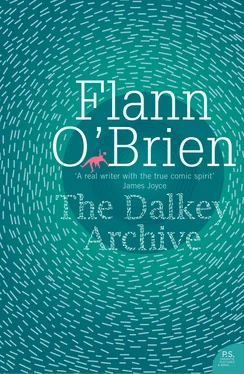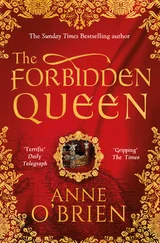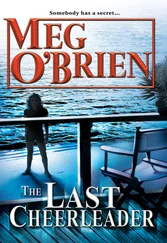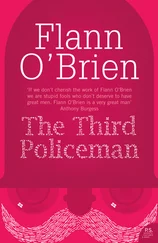They crossed the road, the two escorts lightly assisting at each elbow. Inside the gate a narrow but smooth enough pathway fastidiously picked its way upward through treetrunks and shrubs.
– Might as well introduce myself, the invalid said. My name’s De Selby.
Shaughnessy gave his, adding that everybody called him Mick. He noticed that Hackett styled himself just Mr Hackett: it seemed an attitude of polite neutrality, perhaps condescension.
– This part of the country, De Selby remarked, is surprisingly full of tinkers, gawms and gobshites. Are you gentlemen skilled in the Irish language?
The non-sequitur rather took Shaughnessy aback, but not Hackett.
– I know a great lot about it, sir. A beautiful tongue.
– Well, the word mór means big. In front of my house – we’re near it now – there is a lawn surprisingly large considering the terrain. I thought I would combine mór and lawn as a name for the house. A hybrid, of course, but what matter? I found a looderamawn in Dalkey village by the name of Teague McGettigan. He’s the loçal cabman, handyman, and observer of the weather; there is absolutely nothing he can’t do. I asked him to paint the name on the gate, and told him the words. Now wait till you see the result.
The house could now be glimpsed, a low villa of timber and brick. As they drew nearer De Selby’s lawn looked big enough but regrettably it was a sloping expanse of coarse, scruffy grass embroidered with flat weeds. And in black letters on the wooden gate was the title: LAWNMOWER. Shaughnessy and Hackett sniggered as De Selby sighed elaborately.
– Well the dear knows I always felt that Teague was our domestic Leonardo, Hackett chuckled. I’m well acquainted with the poor bastard.
They sidled gently inward. De Selby’s foot was now dirty as well as bloody.
Our mutilated friend seems a decent sort of segotia, Hackett remarked from his armchair. De Selby had excused himself while he attended to ‘the medication of my pedal pollex’, and the visitors gazed about his living room with curiosity. It was oblong in shape, spacious, with a low ceiling. Varnished panelling to the height of about eighteen inches ran right round the walls, which otherwise bore faded greenish paper. There were no pictures. Two heavy mahogany bookcases, very full, stood in embrasures to each side of the fireplace, with a large press at the blank end of the room. There were many chairs, a small table in the centre and by the far wall a biggish table bearing sundry scientific instruments and tools, including a microscope. What looked like a powerful lamp hovered over this and to the left was an upright piano by Liehr, with music on the rest. It was clearly a bachelor’s apartment but clean and orderly. Was he perhaps a musician, a medical man, a theopneust, a geodetic chemist … a savant?
– He’s snug here anyway, Mick Shaughnessy said, and very well hidden away.
– He’s the sort of man, Hackett replied, that could be up to any game at all in this sort of secret HQ. He might be a dangerous character.
Soon De Selby re-appeared, beaming, and took his place in the centre, standing with his back to the empty fireplace.
– A superficial vascular lesion, he remarked pleasantly, now cleansed, disinfected, anointed, and with a dressing you see which is impenetrable even by water.
– You mean, you intend to continue swimming? Hackett asked.
– Certainly.
– Bravo! Good man.
– Oh not at all – it’s part of my business. By the way, would it be rude to enquire what is the business of you gentlemen?
– I’m a lowly civil servant, Mick replied. I detest the job, its low atmosphere and the scruff who are my companions in the office.
– I’m worse off, Hackett said in mock sorrow. I work for the father, who’s a jeweller but a man that’s very careful with the keys. No opportunity of giving myself an increase in pay. I suppose you could call me a jeweller too, or perhaps a sub-jeweller. Or a paste jeweller.
– Very interesting work, for I know a little about it. Do you cut stones?
– Sometimes.
– Yes. Well I’m a theologist and a physicist, sciences which embrace many others such as eschatology and astrognosy. The peace of this part of the world makes true thinking possible. I think my researches are nearly at an end. But let me entertain you for a moment.
He sat down at the piano and after some slow phrases, erupted into what Mick with inward wit, would dub a headlong chromatic dysentery which was ‘brilliant’ in the bad sense of being inchoate and, to his ear at least, incoherent. A shattering chord brought the disorder to a close.
– Well, he said, rising, what did you think of that?
Hackett looked wise.
– I think I detected Liszt in one of his less guarded moments, he said.
– No, De Selby answered. The basis of that was the canon at the start of César Franck’s well-known sonata for violin and piano. The rest was all improvisation. By me.
– You’re a splendid player, Mick ventured archly.
– It’s only for amusement but a piano can be a very useful instrument. Wait till I show you something.
He returned to the instrument, lifted half of the hinged top and took out a bottle of yellowish liquid, which he placed on the table. Then opening a door in the nether part of a bookcase, he took out three handsome stem glasses and a decanter of what looked like water.
– This is the best whiskey to be had in Ireland, faultlessly made and perfectly matured. I know you will not refuse a taiscaun.
– Nothing would make me happier, Hackett said. I notice that there’s no label on the bottle.
– Thank you, Mick said, accepting a generous glass from De Selby. He did not like whiskey much, or any intoxicant, for that matter. But manners came first. Hackett followed his example.
– The water’s there, De Selby gestured. Don’t steal another man’s wife and never water his whiskey. No label on the bottle? True. I made that whiskey myself.
Hackett had taken a tentative sip.
– I hope you know that whiskey doesn’t mature in a bottle. Though I must say that this tastes good.
Mick and De Selby took a reasonable gulp together.
– My dear fellow, De Selby replied, I know all about sherry casks, temperature, subterranean repositories and all that extravaganza. But such considerations do not arise here. This whiskey was made last week.
Hackett leaned forward in his chair, startled.
– What was that? he cried. A week old? Then it can’t be whiskey at all. Good God, are you trying to give us heart failure or dissolve our kidneys?
De Selby’s air was one of banter.
– You can see, Mr Hackett, that I am also drinking this excellent potion myself. And I did not say it was a week old. I said it was made last week.
– Well, this is Saturday. We needn’t argue about a day or two.
– Mr De Selby, Mick interposed mildly, it is clear enough that you are making some distinction in what you said, that there is some nicety of terminology in your words. I can’t quite follow you.
De Selby here took a drink which may be described as profound and then suddenly an expression of apocalyptic solemnity came over all his mild face.
– Gentlemen, he said, in an empty voice, I have mastered time. Time has been called, an event, a repository, a continuum, an ingredient of the universe. I can suspend time, negative its apparent course.
Mick thought it funny in retrospect that Hackett here glanced at his watch, perhaps involuntarily.
– Time is still passing with me, he croaked.
– The passage of time, De Selby continued, is calculated with reference to the movements of the heavenly bodies. These are fallacious as determinants of the nature of time. Time has been studied and pronounced upon by many apparently sober men – Newton, Spinoza, Bergson, even Descartes. The postulates of the Relativity nonsense of Einstein are mendacious, not to say bogus. He tried to say that time and space had no real existence separately but were to be apprehended only in unison. Such pursuits as astronomy and geodesy have simply befuddled man. You understand?
Читать дальше












